
The governor has tapped a longtime state regulator to lead Georgia’s Environmental Protection Division.
Jeff Cown, who now oversees the state’s parks and historic sites, was nominated by Gov. Brian Kemp to replace Richard Dunn, who is now the director of the governor’s Office of Planning and Budget. The Board of Natural Resources met briefly by teleconference during a special called meeting Wednesday to confirm Cown, which they did unanimously.
Cown will become the next EPD director on Aug. 16. He will earn an annual salary of $190,000.
“With an accomplished and dedicated history in this field, he will be an asset to the Division as it continues the essential work of ensuring Georgia remains a good steward of our natural resources while balancing the needs of our citizens,” Kemp said in a statement Wednesday.
Before he became director of the State Parks and Historic Sites Division in 2018, he spent 28 years with EPD in various roles dealing with solid waste, surface mining, hazardous waste and other issues before ultimately leading the land protection branch. He studied agricultural engineering at the University of Georgia.
The department’s parent agency is also in between commissioners right now. Walter Rabon has been running the agency in an interim capacity since Commissioner Mark Williams stepped down to lead the Jekyll Island Authority.
“He’s the steady hand that we need on that right now,” board member Ray Lambert said of Cown.
Cown will inherit a bevy of challenges. The state agency is weighing whether to allow an Alabama-based company to mine near the Okefenokee National Wildlife Refuge, which is a proposal that has stirred spirited public opposition and pushback from lawmakers.
“I do have a background in it, but I’ve got to look at it and see where we’re at,” Cown told reporters after Wednesday’s vote. “A lot of it’s scientific but you have to take that scientific review of it and get that communicated to the people and gain their trust by working with them.”
And federal regulators are taking steps to crackdown on sites where toxic coal ash has been left in unlined pits in contact with groundwater, as Georgia Power plans to do at a few legacy fossil fuel locations. As chief of the land protection branch, Cown helped develop Georgia’s state-level coal ash rules, which he called “very strong.”
“We’ll continue to look at that and make sure we’re protecting there and doing the right thing with the utilities that have the coal ash sitting there in those ponds,” Cown said.
He said a looming challenge in his mind is ensuring the agency has the staffing it needs to carry out its duties effectively. But he said that may not require petitioning the governor and lawmakers for more funding but doing more to “right size” salaries and staffing to recruit and keep employees.
“We need to make sure we have protection of environment and natural resources with smart economic growth in this state,” Cown said.
The new budget process kicked off this week, with Dunn giving state agencies the green light Wednesday to request a spending increase for the first time in years. It’s also a change in tone for state budget writers who had been bracing for a recession.
Agency leaders can request up to 3% more in spending for the current and next year’s budgets or ask for one-time spending bumps for projects. But such proposals should also offer ways to shave off 1% in savings through greater efficiencies in the new budget year that starts next July.
“Both ongoing enhancements and one-time investment opportunities should be targeted at initiatives that can ‘move the needle’ on program outcomes, improve customer service, or provide significant future improvement on how we do business or deliver services as a state,” Dunn wrote in a Wednesday memo.
This story comes to Rough Draft via a media partnership with Georgia Recorder.
